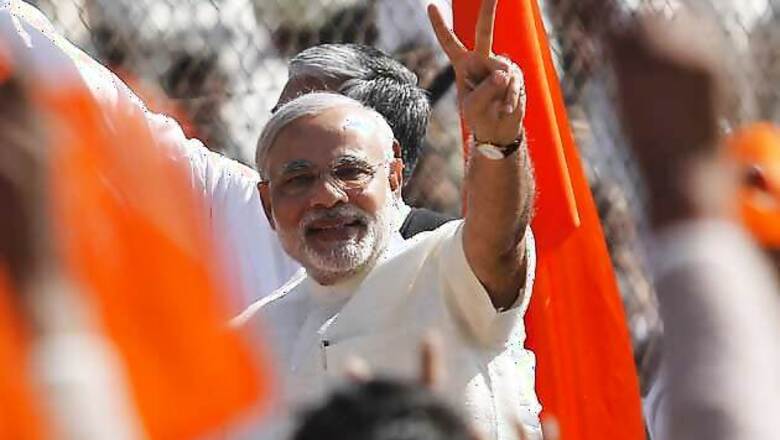
views
No one can prove it, but the recent uptick in the Indian stock markets is widely suspected to be the NaMo bounce. NaMo, as in Narendra Modi, the Bharatiya Janata Party (BJP) candidate for prime minister in case the party wins enough seats to form the next government. Goldman Sachs, Nomura and CLSA, among others, claim to have spotted the NaMo effect and have begun factoring in a stock market rise following a possible BJP victory in the Lok Sabha polls of April-May 2014.
In short, the market mavens are saying that despite depressing economic news-weak industrial output growth, a stagnant GDP, double-digit inflation, and a slippery fiscal situation-a change in the political dispensation will be enough to drive stock prices. They are also penciling in the hope that good politics will henceforth drive good economics.
Will it? Will the NaMo bounce play out even if he comes to power? It would be good to look at the factors that favour a continuation of the bounce, and those that don't.
The things that won't change even if Modi is the next prime minister - unless we are expecting a clear BJP majority on its own - is that many bad laws will remain on the statute book. The Food Security Bill cannot be scrapped - and it will be a permanent drain on the central exchequer. The Land Acquisition Bill will make all projects more expensive, and infrastructure will become less viable without huge subsidies. Energy pricing - oil, coal, gas - will be difficult to free if we have a minority government, and subsidy cuts - in fertiliser, for example - will be tough to negotiate with allies, especially with a farmer-friendly Akali Dal as coalition partner.
Labour laws that need wholesale dumping will not be easy to tinker with. And the structural rigidities in agriculture - which hinder interstate movement of farm produce and keep prices at the retail end high-are not something the centre can do anything about.
Why then is the market running ahead of reality? There could be two reasons. One is about sentiment. The one thing a BJP victory would change is the negativity now floating like smog above the Indian economy. Widely seen as business-friendly, a Modi-led government would certainly not do anything to worsen the gloom. It may come as a breath of fresh air.
Though bad laws - like the Food and Land Bills - cannot be easily de-legislated, in India laws can be made to atrophy by any political dispensation that is disinclined to implement them. Since many of the reforms needed to move the economy forward can be executed without major legislative effort, one can assume that NaMo will make a difference in hidden ways even without fooling around with laws.
The second reason why the market is feeling more cheerful than it should is its growing impatience with zero returns. The fact is no one-barring a few punters-has really made money in the stock market for the last five years, and the Sensex is really no higher than what it was in 2008 despite an average growth of over 6 percent a year, during the same period.
If you were to look at the numbers that relate growth to market, each one of them shows that the indices have nowhere to go but up. The Sensex's price-to-earnings ratio is barely 17 - which makes it attractive. This ratio moves in the range of 11 to 27, and 27 is clearly further off from the index right now than 11. In short, one should bet on the upward trajectory, assuming the sky is not going to fall on our heads.
Another broad factor that favours a market bounce is the market capitalisation-to-GDP ratio. This ratio is currently just 65 percent of GDP whereas in 2008 the ratio was 1:1 - ie, market cap was equal to GDP. What this suggests is that the market has not factored in five years of growth - however slow - into its valuations, and this needs to change.
Then there is the lack of bounce in alternate asset classes. Real estate attracted a lot of investment in the boom years. People have still not given up the false belief that property prices have nowhere to go but up. But gravity is catching up on this sector, too. Gold has crashed globally and, but for the exertions of one P Chidambaram, it would have crashed in India too. It is only an illogical import duty structure that is holding up domestic prices of gold, encouraging illegal sources of supply. As for bonds and bank fixed deposits, we are clearly into financial repression. The returns on safe avenues are well below consumer inflation - and could trend even lower in the short run.
Start ruling out one investment option after another, and what you are left with is stocks. Can stocks fall? Of course, they can, but here we are up against another reality. Right now, stock prices are being held up primarily because the large buyers - foreign institutional investors (FIIs) - are trapped between a weak rupee and a shallow market. If the FIIs, who have around $200 billion invested in Indian equity, try to sell, the market crashes so badly that they end up shooting themselves in the foot. The FIIs know that their best bet is to sit on their investments and wait for the markets to revive, and the rupee to strengthen under a new government before they start churning. But then, if the economy does revive, it makes no sense for them to sell.
The FIIs have no option but to believe in the India story even if the proof is currently skimpy. They would like to believe in the NaMo bounce whether it exists or not. Belief in a bull run is as important to them as belief in the India fundamentals.
So, let me stick my neck out and say this: The odds are that the stock markets will rise in 2014. I would bet the Sensex will hit 25,000 by the end of the fiscal 2014-15 with or without NaMo. With NaMo, it could easily scale 30,000.



















Comments
0 comment